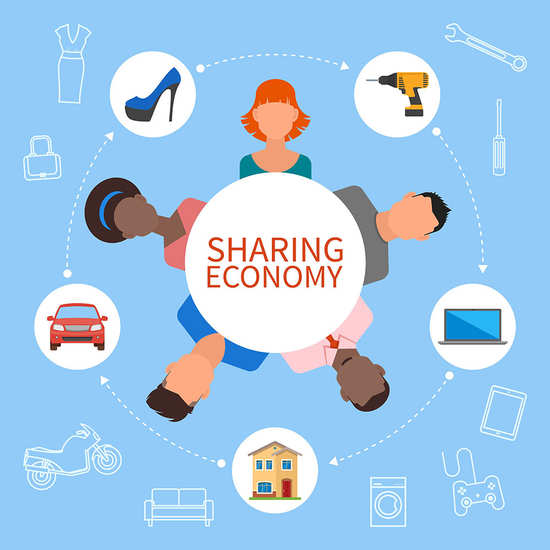
In practice, the sharing economy is nothing new. It’s been around for a thousand years, in fact. Societies have always shared the use of assets.
But then the internet came along, and following close behind was Big Data.
These technologies have revolutionized the way asset owners can find each other to share resources in mutually beneficial agreements. In this modern digital context, this new dynamic is known as the shareconomy, collaborative economy, peer economy, collaborative consumption, and probably a dozen other terms that creative thinkers have dreamed up for it.
As Investopedia notes, sharing economies allow individuals and groups to make money from underused assets. In this way, physical assets are shared as services. Take for instance car sharing services like Lyft and Uber. According to data provided by the Brookings Institute, private vehicles go unused for 95% of their lifetime. The same report detailed Airbnb’s cost advantage over the hotel space as homeowners make use of spare bedrooms. Airbnb rates were reported to be between 30-60% cheaper than hotel rates around the world.
As Melissa Thompson observes in Small Biz Trends, running a small business has plenty of side-benefits. As she writes:
“A huge budget usually isn’t one of [the perks], so small businesses have to continually look for ways to stretch a dollar and make the most out of the operating budgets they do have. Finding ways to save on expenses while increasing profits is necessary to stay afloat. One way for small businesses to save on costs associated with running a business is to utilize today’s economy of sharing. With the nation’s workplaces being filled with Millennials, companies are changing the way they do business. Instead of larger corporations keeping their cubicles filled with life-long, dedicated employees, companies are now hiring employees who are more caring, sharing, and have a lower level of commitment than their older peers in the business world. For smaller businesses with fewer employees, this millennial mindset and the sharing economy, sometimes called ‘collaborative consumption,’ can save money on operating expenses and raise profits if done correctly.”
Joey Tyson of In Motion Ventures notes that for decades, owning a car was the sign of personal status. As he puts it, “it was as much a statement of social mobility as an indicator of financial stability.” It’s not like that anymore. For those in urban areas especially, it’s all about efficient, cheap travel that gets you from A to B as quickly as possible. It no longer matters how. As Tyson says:
"Any transport system – whether it be the rural buses that connect the villages of West Yorkshire or the underground trains that make London’s boroughs just minutes apart – has to achieve one simple goal in order to be considered successful: it must meet the needs of the many. With the global population growing at a rapid pace – the number of people living in London has increased by 12% since 2001; a recent census for New York found that the city is well on course to meet its 2020 population projection; and the World Economic Forum states that Shanghai welcomes 51 new citizens every hour – the transport infrastructure of cities and the way people travel within them has evolved."
This is just one example among many. Here are four ways that small businesses can benefit from the sharing economy:
- Renting Unused Assets
- Sharing Office Space with Freelancers and Entrepreneurs
- Marketing Products and Services to a Wider Audience
- Borrowing Money for Business Growth
In conclusion, it seems fair to say that the “Sharing Economy” offers a great deal of opportunity for those not yet taking advantage of it.
